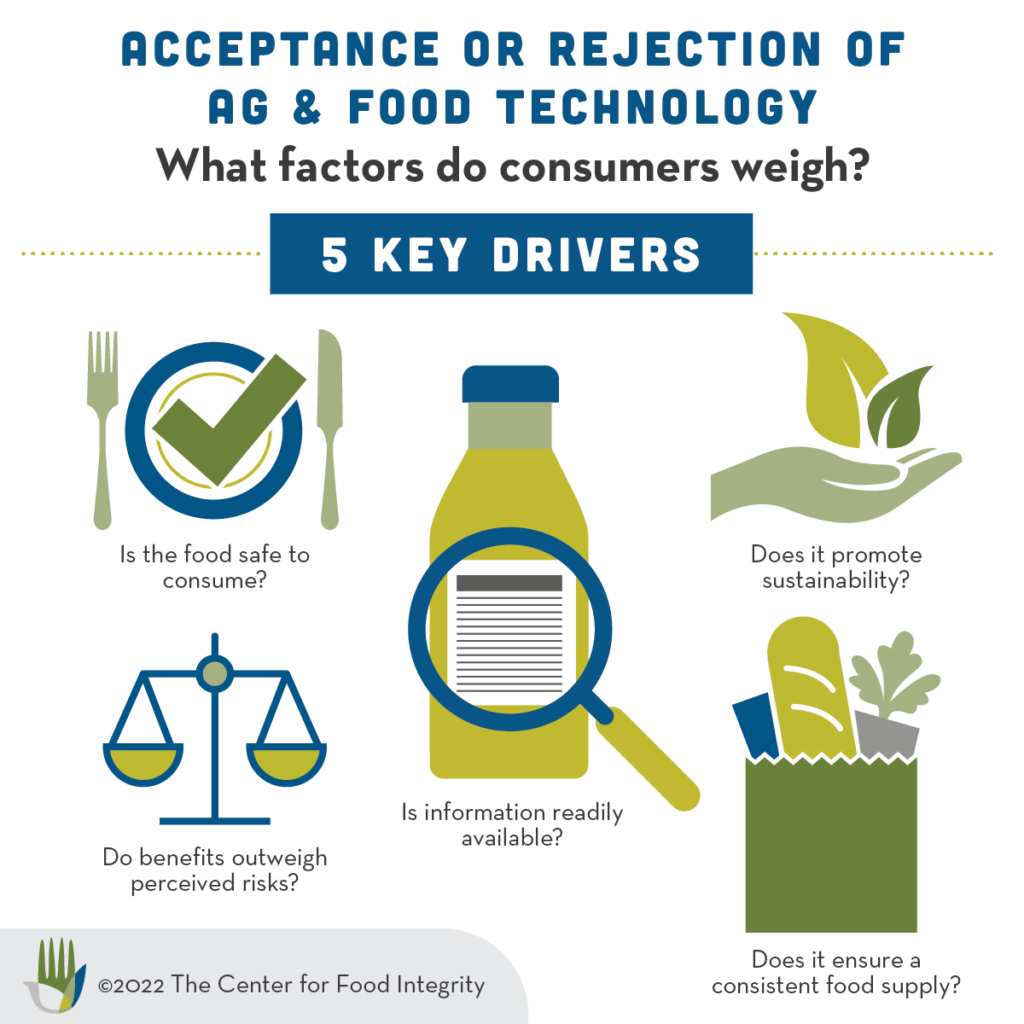What is it that makes consumers accept or reject the technology driving agriculture? The innovations that help farmers and ranchers produce more food in more sustainable ways?
Agriculture has a rich history of innovation. As farming and food production practices integrate more technology, it’s increasingly important for those in agriculture to understand the keys to successfully building support for technology so those growing, raising and producing our food can continue to make progress.

Research from The Center for Food Integrity (CFI) has identified the driving factors of consumer acceptance or rejection of technology in agriculture. Farmers and other organizations can gain insights on how to engage to earn trust and advance the technology crucial to U.S. agriculture in maintaining a safe, sustainable food supply.
The research, conducted with support from the United Soybean Board (USB), measured consumer attitudes regarding four agriculture and food technologies. The goal was not to gauge attitudes about those particular technologies (although we do have rich information on each as a result of the research), but rather to identify the overarching drivers of consumer acceptance and rejection of technology as a whole. The technologies used as prompts in this study included gene editing in plants, gene editing in animals, plant-based meat and cultured (cell-based) meat.
Acceptance Drivers
Several consistent themes regarding support for and rejection of technology emerged in the study. We identified five key drivers:
- Belief that food resulting from technology use is safe to consume
- Information on food produced through technology is readily available so consumers can make an informed, voluntary choice
- Benefits outweigh perceived risks
- Technology can help ensure a consistent supply of food
- Technology promotes greater sustainability by making more with a lesser environmental impact
In other words, if a consumer believes the technology in question meets these standards, they’ll likely trust and accept it. If the technology fails to live up to any one of these standards, trust begins to erode.
Additional Factors
Acceptance of food and ag technology may be highly dependent on whether the output of the technology is ingested by consumers. Consumers are more concerned about pesticides and gene editing, for example, that directly impacts food as opposed to technologies like drones or GPS systems.
There’s also more concern about the direct impact on animals compared to plants. Consumers tend to anthropomorphize animals, leading to less acceptance of ag technology that involves changing them.
Consumers trust in the organizations that approve and monitor the impact of technologies, and they prefer third-party, independent oversight, along with information from that third-party source.
This study shows acceptance of ag technology is highly dependent on the tangible nature of the technology output. In other words, ingredients are not as ‘visible’ to consumers, while end products like meat sold in restaurants or grocery stores are very visible. The more tangible the product and perceived impact, the greater the need to deploy a strategic approach to earn acceptance.
Acceptance of technology may also be dependent on the degree to which it challenges cultural norms. For example, the American tradition of “grilling out,” which evokes strong emotions for some, just wouldn’t be the same with a cultured steak or plant-based burger.
While the research shows only one in 10 consumers feel they know a lot about the use of technology to grow food in the U.S., nearly two-thirds have a very positive or somewhat positive impression of the use of technology.
That points to a tremendous opportunity for those in agriculture and food to keep the momentum going and engage on the topics that are most important to consumers as they form opinions on the technology that can help those who raise, grow and produce foods do so more sustainably.
For an in-depth overview of the research, watch the on-demand webinar “Key Drivers to Consumer Acceptance of Ag and Food Technology.” If you’re interested in providing training for your team on earning trust in technology, please reach out at learnmore@foodintegrity.flywheelsites.com.
